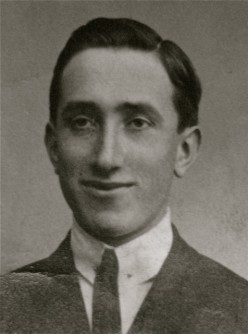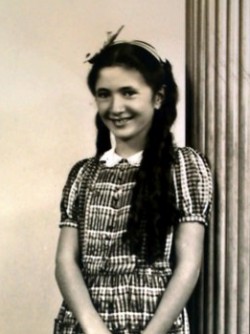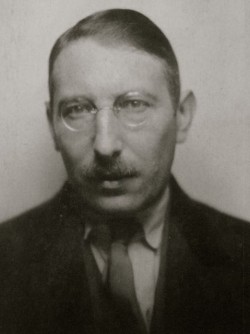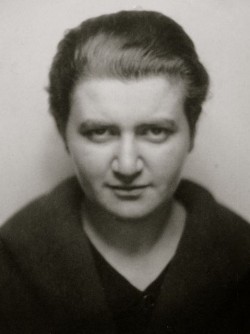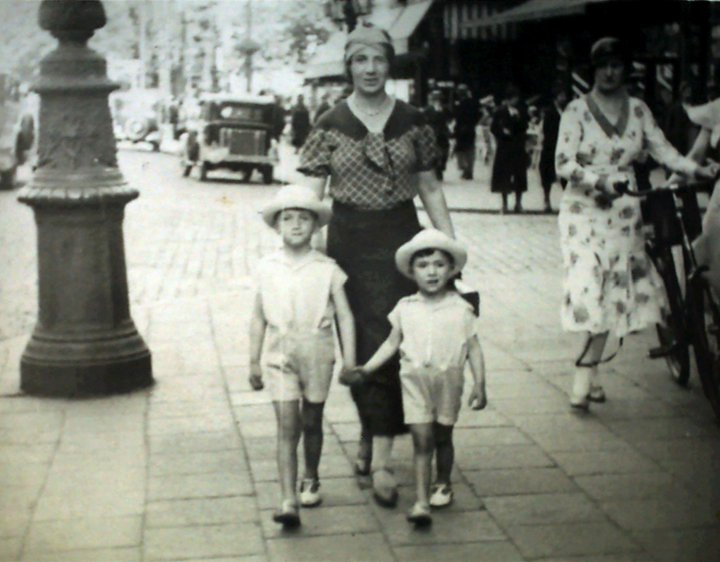Deutsch
Visa Recipients
- DEUTSCH, Bernard P
Age 41 - DEUTSCH, Hélène née HOFFMAN P
Age 42 - DEUTSCH, Henri V P T
Age 10 - DEUTSCH, Joséphine/Josette Charlotte V P
Age 6 - DEUTSCH, Maurice
- DEUTSCH, Paul P
Age 49 - DEUTSCH, Sara née LEWIN P
Age 35 - DEUTSCH, Siegfried
Age 12 - DEUTSCH, Simon P
Age 12 - DEUTSCH, Simon
About the Family
The DEUTSCH families received visas signed by Aristides de Sousa Mendes in Bordeaux on June 19, 1940.
They crossed into Portugal, where they resided in Porto and Figueira da Foz. Bernard DEUTSCH and his family subsequently sailed on the ship Nea Hellas from Lisbon to New York in September 1940.
Paul DEUTSCH and his family went to the United Kingdom, where they settled.
- Videos
- Photos
- Testimonials
Testimonial of Henri Zvi DEUTSCH, 1992
Letter to Diana Andringa, April 2, 1992
My parents, brother, sister and I as well as my Uncle Paul, Aunt Zilly, cousins Zeev and Simon and my father's cousin Maurice Deutsch were all recipients of the precious Portuguese visas, thereby enabling us to escape from the clutches of the Nazis. I feel a great indebtedness to Dr. Mendes and thank you for permitting me to share my story.
My grandfather moved to Antwerp in the 1880s from Hungary. He had five sons, who were born in Belgium. My father, Bernard, was the youngest. The main occupation of the Antwerp Jewish community was in diamonds, and my grandfather and his sons were active brokers and cutters. My uncle Carol was also an artist; he had studied with Baron James Ensor, Belgium's foremost contemporary artist, and was part of the "Ostend School."
Ironically, Antwerp was also the city where Dr. Mendes was posted at the very time that I was growing up. Nazi warplanes bombarded Antwerp on May 10th, and on May 12th, we joined the army of refugees. We took an "early vacation" to Ostend, where my father met his brother Carol; together they visited Baron Ensor, who offered my father his visiting card. On the 14th, my parents decided to move on to Paris -- via Dunkirk. Paris was teeming with refugees. There were constant bombing raids, so five days later we moved southward to a village near Bordeaux called Lacanau Ocean where we rented a villa and planned on staying for the duration of the war. "We" included my immediate family and Uncle Paul and family. In time, other families from Antwerp also found refuge in the village. My brother and I attended a two-room schoolhouse; he was eleven and I was nine. On Thursdays, the men took a train to Bordeaux to learn the latest war news and to buy Kosher food. On Thursday, June 20th [sic: probably Wednesday, June 19], Uncle Paul returned home alone, and told my mother to pack and to meet my father in Bordeaux the next day. Paris had fallen, northern France was occupied by the German army, thereby closing the Swiss and Italian borders, and British warships were patrolling the seacoast thereby preventing ships from going to Palestine -- the only country that would have welcomed Jews. The sole escape was through Spain and Portugal.
Unfortunately, the Portuguese consulate in Bordeaux was mobbed with thousands of refugees, so it was decided that Uncle Paul return to Lacaneau and prepare for our departure while my father remain in Bordeaux until he was issued visas to Portugal for both families. After a long wait, my father fulfilled his mission. He was able to rent a room for the night -- a night he was to remember for a bombing mission flew overhead destroying the house across the street from where he was staying.
We met my father the next day [June 20] and drove by cab to see the street where he narrowly escaped death. We took a train to Dax, where we spent a week, awaiting our luggage which was lost. Fortunately, the next Saturday we were reunited with our luggage and we were ready to leave France. Trains were no longer available for civilians; they were reserved for army personnel. My father met the Alexander Rebbe, a well-known rabbi acquaintance from Antwerp, who told him that it was permissible to travel on the Sabbath, as it was a matter of life or death. By a stroke of luck, my father was able to engage a Belgian farmer who was carrying produce in his truck. For a hefty sum, he agreed to take us to the border. My father and Uncle Paul's family -- nine people -- piled in his truck -- hidden behind sacks of potatoes. We were stopped occasionally by soldiers, but they let us through. When we were a few kilometers from Irun -- the French-Spanish border -- the road was filled with refugees. The driver let us out and we had to trudge along with the other refugees. Evening came and we were next in line to be processed for crossing into Spain where the border closed for the night.
There was no place to go. Behind us were thousands of refugees, ahead of us was a closed border. We were the most fortunate of the lot, however, for the custom house -- a small building with a stucco bench, was between us and the border. My mother, sister and I were able to spend the night on the bench, while a tremendous downpour of rain drenched the other refugees. The space was so small, we didn't even have enough room for the few pieces of luggage -- which were ruined in the rain. That night, my father and Uncle Paul met their cousin Maurice, who was also a recipient of one of the precious visas. The next morning we were the first ones to cross the border. I remember how my brother and I jumped over the border a hundred times, so we could say that we had been a hundred times in France and Spain!
Once in Spain, we went to a hotel to wash and rest. We were able to buy railway tickets to Portugal -- standing room all the way. All we had to eat was dry bread and hard cheese -- for years afterwards I refuged to eat hard cheese. I remember the ruins from the civil war Spain had undergone. It was past midnight when we reached the Spanish-Portuguese border. Following an extensive search by customs officials, we were allowed to leave the train. Townspeople, trying to cash in on the misfortune of the refugees, were announcing the availability of "rooms for the night." We spent the night in a poor farmer's hovel -- the "beds" were wooden boards covered with sacks of straw. I shared a bed with my father, but I couldn't sleep. Some time during the night, a woman with a long white nightgown and flowing long hair, carrying a candle, entered the room. She was going through our clothes. I was so frightened that I fell off the "bed." The noise frightened her and she disappeared. Years later, when I read Macbeth, Lady Macbeth's sleepwalking scene brought back images of our "hostess."
We settled in Oporto. As refugees were still a novelty in Portugal, we befriended a number of French-speaking young men. They were extremely kind and gracious to us. In time we rented a small apartment, as it was expensive to stay at a hotel and awkward if one observed the Jewish dietary laws. In our new home, my mother cooked, baked, fried and marinated sardines, which became a staple in our diet. The Portuguese government encouraged us to seek refuge elsewhere; my father was able to obtain visas to Haiti, but our dream was to go to the United States, where my mother had two sisters and a brother; Uncle Jacob was newly-arrived from Germany, where he had been a rabbi in Frankfurt-am-Main. One day, when my father was denied permission to see the American Consul, he handed the secretary Baron Ensor's visiting card and was quickly ushered in to see the Consul.
My mother started to have severe headaches at this time, and her doctor thought that she was going to die. She pulled through, but suffered headaches for the remaining thirty-five years of her life.
One of my American uncles -- Uncle Shimon -- was a traveling salesman and he applied for an affidavit on our behalf, but his request was denied. He was asked how he could support another family of five. My Uncle Jacob, who was now rabbi of Congregation Ohav Zedek in N.Y.C., had one of his congregants, a Mr. Margaretten, who owned a Kosher food company, put up $50,000 in stock in his company on our behalf. When he went to see the American Consul in N.Y., the latter remarked, "This is the 116th cousin you've brought out."
We booked passage on the Nea Hellas, a Greek liner. We spent the last few days in Lisbon, and many of our friends saw us off. We arrived in N.Y. on September 12, exactly four months after we began our flight. It was a memorable entrance into New York Harbor as our ship crashed into a steamer and the accident made the front page of the New York Times.
Uncle Paul spent a year in Portugal, awaiting a visa to the U.S. On the day they were set to sail for England, the American visa arrived, but they decided to go to England. He had "inherited" some of our friends. One young man in particular, Carlos Rademacker, had been especially close to us. Carlos wrote to us in the States, signing his name Abraham Isaac Carlos Rademacker, with a star of David in the corner, requesting that we send him a Jewish woman to marry. When I visited Uncle Paul in London in 1961, I learned that Carlos had converted to Judaism and married a Jewish poetess. A possibility is that he came from Marrano background and his contact with us stirred up his "Jewish soul." It is my great regret that we lost touch; I understand that he died a few years ago.
When I met my Aunt Zilly in Israel in 1987, we reminisced about our flight and she commented that the Belgian Government in Exile had helped support the Belgian citizens in Portugal during that trying period.
I had always known that we had survived thanks to the visas my father had obtained in Bordeaux, but I did not know the Consul's name or the fate that befell him due to his humanitarian deed until 1987, when my brother sent me the clipping of the article from the New York Times. A s a Holocaust educator, I have taken it upon myself to tell the story of Dr. Mendes. I contacted "The International Committee to Commemorate Dr. Aristides de Sousa Mendes" as soon as I discovered its existence. I wrote a short play about Dr. Mendes for a workshop I presented at a conference on "Teaching the Holocaust Through Drama" and I hope to eventually write a full-length play about Dr. Mendes. I will appear on a panel dealing the "Righteous Gentiles" at a conference in Los Angeles this August together with John Paul Abranches; I am excited about the prospect of meeting a son of the man who saved my life.
Testimonial of Henri Zvi DEUTSCH, 1997
In June 1940, my family and I were refugees from Antwerp, Belgium. We had settled in Lacanau d'Océan, a village some 25 kilometers from Bordeaux.
About a dozen other Jewish families had found refuge there, including my Uncle Paul and his family. On Thursdays, the men went to Bordeaux to learn the latest war news, as we had no radios, and to buy kosher food.
On June 20 [sic: should be June 19], Uncle Paul returned alone, and told my mother to pack, as we were to meet my father in Bordeaux the following morning. Apparently Paris had fallen and northern France was occupied, thereby closing the Swiss and Italian borders. The only means of escape from the grasp of the German army was by ship, but British warships were patrolling the seacoast to prevent ships from going to Palestine -- the one country willing to accept Jews -- or through Spain or Portugal.
Thousands of refugees had flocked to Bordeaux. It seemed as if they all had the same idea: apply for a visa to Spain or Portugal. Since only the Portuguese Consulate was issuing visas, it was decided that my father remain in Bordeaux until he received visas for both families and we were to join him in Bordeaux the following morning.
What had troubled my father was the fact that he had not taken his passport along. We had fled with just two suitcases with our summer clothes -- and whatever diamonds my father had in the Bourse. Like many of Antwerp's Jews, my father was a diamond broker. Possessing diamonds enabled us to flee and covered our traveling expenses for a few months. Apparently the lack of passports was not a problem, for my father obtained transit visas to Portugal, which also enabled us to travel through Spain.
Whenever my father recalled our flight, he mentioned the crowd in front of the Portuguese Consulate. It seemed as if everyone in the line was an authority on the war! Native people appeared out of nowhere selling sandwiches and bottled water. Occasionally a man or woman came on the balcony and calmed the crowd, which seemed to grow bigger with each passing hour.
By late afternoon it was my father's turn to enter the building housing the Consulate. Everyone seemed to have quieted down as they went up the stairs, step by step, each refugee praying that his request for a visa would be granted.
When they entered the Consulate they were welcomed by a reassuring voice, apparently the same Portuguese lady who had appeared on the balcony, who told them not to worry. They would all be granted visas to Portugal. She also told them to help themselves to something to drink as she pointed to a table set with pitchers and glasses. She then joined three men at the desk and table who asked a few questions and issued visas to everyone. What impressed my father most was that he never saw anyone pay for the visas.
As he left the Consulate, visas in his pocket, it was already dark outside. Out of nowhere a young man appeared, and asked if he was looking for a room for the night. With a mixture of relief and apprehension, my father followed the stranger, who led him to an old tenement. The price for a cot in the room shared with the young man was expensive, but it was better than walking the streets or staying in the waiting room at the railway station.
That night [June 19-20] there was a bombing raid over Bordeaux and the house across the street was hit. My father fell off the cot and muttered a prayer. The next morning [June 20] -- after we were reunited and heard his story -- he pointed out the demolished house only a few yards away from his refuge for the night.
After a harrowing journey we reached Portugal where we stayed until we were granted visas for the States. We settled in New York and it wasn't until 1987 that I learned from an article in The New York Times that our savior in Bordeaux was none other than Dr. Aristides de Sousa Mendes. Later I learned that the "reassuring Portuguese lady" was none other than his wife Angelina.



